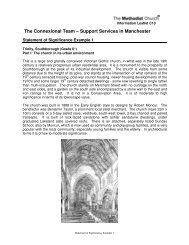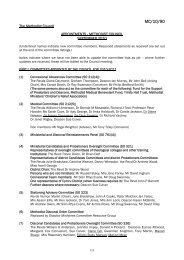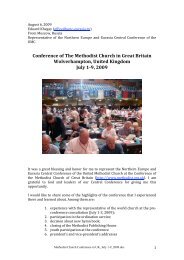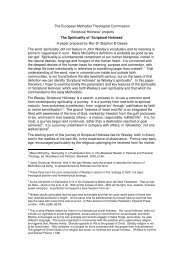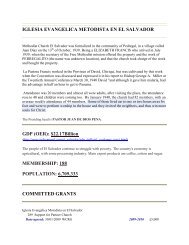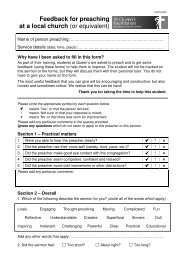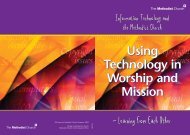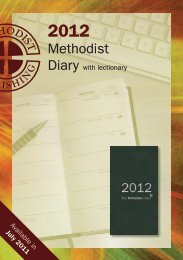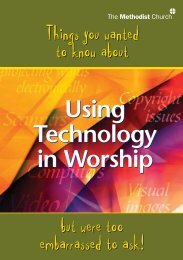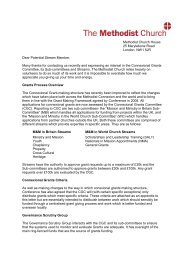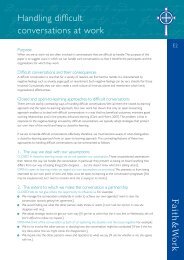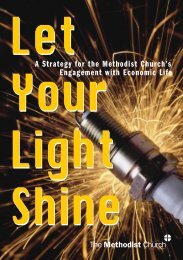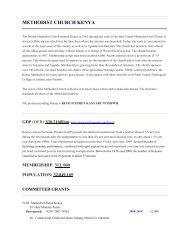Discipleship and the people called Methodists - BEH District
Discipleship and the people called Methodists - BEH District
Discipleship and the people called Methodists - BEH District
You also want an ePaper? Increase the reach of your titles
YUMPU automatically turns print PDFs into web optimized ePapers that Google loves.
Christians, like those who sought out Wesley, have a desire to be disciples of<br />
Jesus, to pray, to worship, to live out <strong>the</strong>ir faith. But that doesn’t mean <strong>the</strong>y know<br />
how. They must enter an environment which enables <strong>the</strong>m to be taught how to be<br />
disciples, given examples of what it means to follow Christ. For <strong>Methodists</strong> this<br />
environment was society <strong>and</strong> class <strong>and</strong> provided <strong>the</strong> mutual support of o<strong>the</strong>rs,<br />
learners learning toge<strong>the</strong>r how to be disciples of Jesus.<br />
Read through <strong>the</strong> first six chapters of Mark’s Gospel. Notice <strong>the</strong> different<br />
ways Jesus chose very ordinary friends, invested in <strong>the</strong>m by sharing his life<br />
with <strong>the</strong>m, cared for <strong>the</strong>ir loved ones, taught <strong>and</strong> shared ideas <strong>and</strong> values<br />
with <strong>the</strong>m, trusted in <strong>the</strong>m to share his ministry, listened to <strong>the</strong>ir experiences,<br />
challenged <strong>and</strong> stretched <strong>the</strong>m.<br />
How far do our local church structures imitate <strong>the</strong> disciple forming pattern of<br />
Jesus?<br />
The whole <strong>people</strong> of God?<br />
Without trying to implant twenty first century notions of equality into eighteenth<br />
<strong>and</strong> nineteenth century heads, Methodist meetings were markedly inclusive for<br />
<strong>the</strong>ir day. Both men <strong>and</strong> women belonged to Methodist societies <strong>and</strong> classes.<br />
Female class leaders were appointed from early on <strong>and</strong>, though outnumbered by<br />
men, <strong>the</strong> idea of ‘women in leadership’ has not been for British Methodism <strong>the</strong><br />
contentious issue it has for some o<strong>the</strong>r Christian Churches. There are also stories<br />
told of how, at a time when British society was even more class-conscious than<br />
today, ‘Bob’, a lowly worker in a pit or factory, was <strong>the</strong> class leader of ‘William’,<br />
his boss at work, <strong>and</strong> for both of <strong>the</strong>m, in <strong>the</strong> context of discipleship, this was<br />
perfectly acceptable.<br />
Perhaps most significantly though is <strong>the</strong> inclusive role of <strong>the</strong> laity – ‘normal<br />
Christians’(!) – in Methodism. In spite of <strong>the</strong> fact that <strong>the</strong> Wesleys <strong>and</strong> a few<br />
o<strong>the</strong>r ordained clergy exercised leadership in Methodism, <strong>the</strong> great majority of<br />
preachers <strong>and</strong> society <strong>and</strong> class leaders were lay<strong>people</strong>. It’s not without reason<br />
that many refer to Methodism as a ‘lay movement’. There was certainly leadership<br />
<strong>and</strong> authority, but of a kind that assumed that disciples could <strong>and</strong> should minister<br />
to each o<strong>the</strong>r for <strong>the</strong> benefit of all. We’ve noted that what are now known as<br />
Methodist ministers started off as ‘travelling preachers’; visiting <strong>the</strong> societies,



